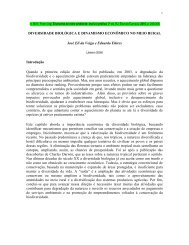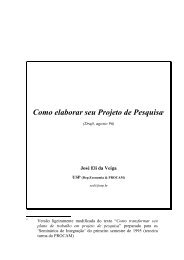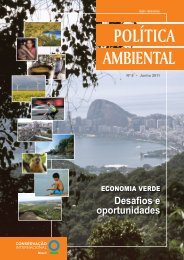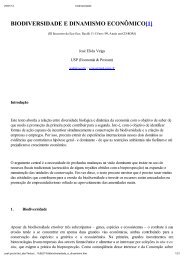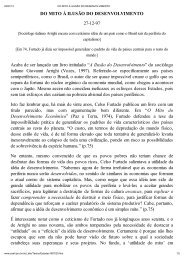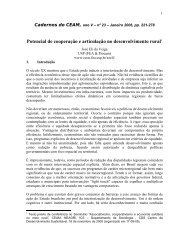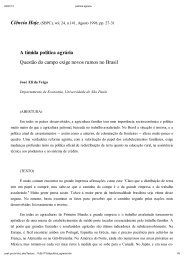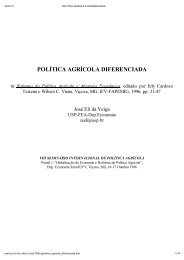sustainable development 20 years on from the ... - José Eli da Veiga
sustainable development 20 years on from the ... - José Eli da Veiga
sustainable development 20 years on from the ... - José Eli da Veiga
You also want an ePaper? Increase the reach of your titles
YUMPU automatically turns print PDFs into web optimized ePapers that Google loves.
165<br />
until six m<strong>on</strong>ths of age should also promoted, which is ano<strong>the</strong>r initiative designed to protect babies <strong>from</strong><br />
envir<strong>on</strong>mental polluti<strong>on</strong>, given <strong>the</strong> huge nutriti<strong>on</strong>al and emoti<strong>on</strong>al benefits. This could be promoted by<br />
extending current maternity and paternity leave (Rico and Pautassi, <str<strong>on</strong>g>20</str<strong>on</strong>g>11).<br />
3. Indigenous peoples and local communities<br />
Principle 22 of <strong>the</strong> Rio Declarati<strong>on</strong> <strong>on</strong> Envir<strong>on</strong>ment and Development states that indigenous peoples and<br />
<strong>the</strong>ir communities and o<strong>the</strong>r local communities have a vital role in envir<strong>on</strong>mental management and<br />
<str<strong>on</strong>g>development</str<strong>on</strong>g> because of <strong>the</strong>ir knowledge and traditi<strong>on</strong>al practices. It calls up<strong>on</strong> States to recognize and<br />
support <strong>the</strong>ir identity, culture and interests and enable <strong>the</strong>ir effective participati<strong>on</strong> in <strong>the</strong> achievement of<br />
<str<strong>on</strong>g>sustainable</str<strong>on</strong>g> <str<strong>on</strong>g>development</str<strong>on</strong>g>.<br />
In <strong>the</strong> past two decades, <strong>the</strong> regi<strong>on</strong> has made visible progress. In c<strong>on</strong>stituti<strong>on</strong>s and in legislati<strong>on</strong><br />
<strong>on</strong> access to land and o<strong>the</strong>r matters, <strong>the</strong>re is now greater recogniti<strong>on</strong> of <strong>the</strong> rights of indigenous peoples<br />
and <strong>the</strong>ir communities and o<strong>the</strong>r local communities, as well as an appreciati<strong>on</strong> of <strong>the</strong> rich culture of<br />
indigenous peoples. Programmes of democratically elected Governments have incorporated indigenous<br />
worldviews, including <strong>the</strong> ancestral c<strong>on</strong>cept of “good life” (buen vivir) (ECLAC/UNFPA, <str<strong>on</strong>g>20</str<strong>on</strong>g>09).<br />
Some global agreements have set precedents <strong>on</strong> <strong>the</strong> course to be followed and have been signed<br />
by most countries in <strong>the</strong> regi<strong>on</strong>. Two key instruments are C<strong>on</strong>venti<strong>on</strong> 169 of <strong>the</strong> Internati<strong>on</strong>al Labour<br />
Organizati<strong>on</strong> (ILO) 12 and <strong>the</strong> more recent United Nati<strong>on</strong>s Declarati<strong>on</strong> <strong>on</strong> <strong>the</strong> Rights of Indigenous<br />
Peoples, adopted by <strong>the</strong> United Nati<strong>on</strong>s General Assembly in <str<strong>on</strong>g>20</str<strong>on</strong>g>07 (ECLAC/UNFPA, <str<strong>on</strong>g>20</str<strong>on</strong>g>09). Of <strong>the</strong><br />
22 countries that have ratified ILO C<strong>on</strong>venti<strong>on</strong> 169, 15 are in Latin America and <strong>the</strong> Caribbean (see<br />
box III.5). In a regi<strong>on</strong> with such a large indigenous populati<strong>on</strong>, this is an important area of work. In <strong>the</strong><br />
Plurinati<strong>on</strong>al State of Bolivia, <strong>the</strong> indigenous populati<strong>on</strong> forms 62% of <strong>the</strong> total populati<strong>on</strong>; in Guatemala,<br />
41%; and in Panama, 10%. 13 Box III.5<br />
RATIFICATION OF CONVENTION 169 OF THE INTERNATIONAL LABOUR ORGANIZATION:<br />
CASE OF THE PLURINATIONAL STATE OF BOLIVIA<br />
The Plurinati<strong>on</strong>al State of Bolivia ratified ILO C<strong>on</strong>venti<strong>on</strong> No. 169 in 1991; in 1994 <strong>the</strong> C<strong>on</strong>stituti<strong>on</strong> recognized <strong>the</strong><br />
country’s “multi-ethnic and multicultural” nature. The c<strong>on</strong>stituti<strong>on</strong>al reforms of <str<strong>on</strong>g>20</str<strong>on</strong>g>04 recognized indigenous<br />
peoples’ right to present candi<strong>da</strong>tes directly, recognizing <strong>the</strong>m as political and social actors in <strong>the</strong>ir own right. O<strong>the</strong>r<br />
nati<strong>on</strong>al regulati<strong>on</strong>s recognize indigenous rights to <strong>the</strong>ir native communal lands, to a share of natural resource<br />
profits, and, am<strong>on</strong>g o<strong>the</strong>rs, <strong>the</strong> right to c<strong>on</strong>sultati<strong>on</strong>. The Plurinati<strong>on</strong>al State of Bolivia also made <strong>the</strong> United Nati<strong>on</strong>s<br />
Declarati<strong>on</strong> <strong>on</strong> <strong>the</strong> Rights of Indigenous Peoples binding as nati<strong>on</strong>al law, and <strong>the</strong> <str<strong>on</strong>g>20</str<strong>on</strong>g>06–<str<strong>on</strong>g>20</str<strong>on</strong>g>07 c<strong>on</strong>stituti<strong>on</strong>al process<br />
included a high level of indigenous participati<strong>on</strong>.<br />
Source: Internati<strong>on</strong>al Labour Organizati<strong>on</strong> (ILO) [<strong>on</strong>line] http://www.ilo.org/indigenous/Activitiesbyregi<strong>on</strong>/LatinAmerica/<br />
Bolivia/lang--en/index.htm.<br />
12<br />
13<br />
ILO C<strong>on</strong>venti<strong>on</strong> 169 c<strong>on</strong>cerning Indigenous and Tribal Peoples in Independent Countries, which was adopted in<br />
1989, is <strong>the</strong> first comprehensive internati<strong>on</strong>al agreement to specify <strong>the</strong> rights of <strong>the</strong>se peoples. It sets out <strong>the</strong><br />
obligati<strong>on</strong>s of States to recognize and respect <strong>the</strong> customs and instituti<strong>on</strong>s of indigenous peoples “where <strong>the</strong>se<br />
are not incompatible with fun<strong>da</strong>mental rights defined by <strong>the</strong> nati<strong>on</strong>al legal system and with internati<strong>on</strong>ally<br />
recognized human rights”.<br />
See <strong>the</strong> Socio-demographic Indicators System <strong>on</strong> Indigenous People and Populati<strong>on</strong>s in Latin America [<strong>on</strong>line]<br />
http://celade.cepal.org/re<strong>da</strong>tam/PRYESP/SISPPI/.



